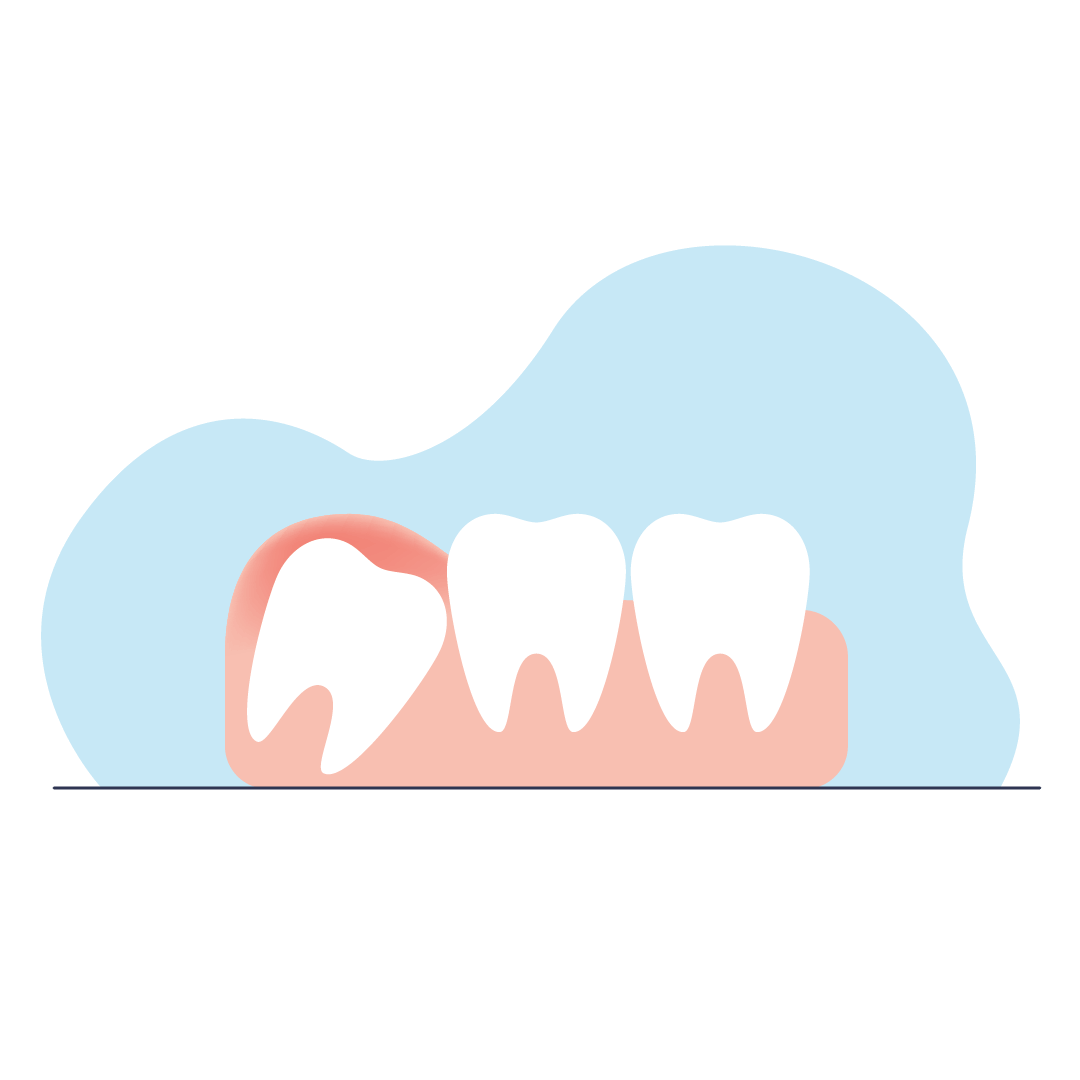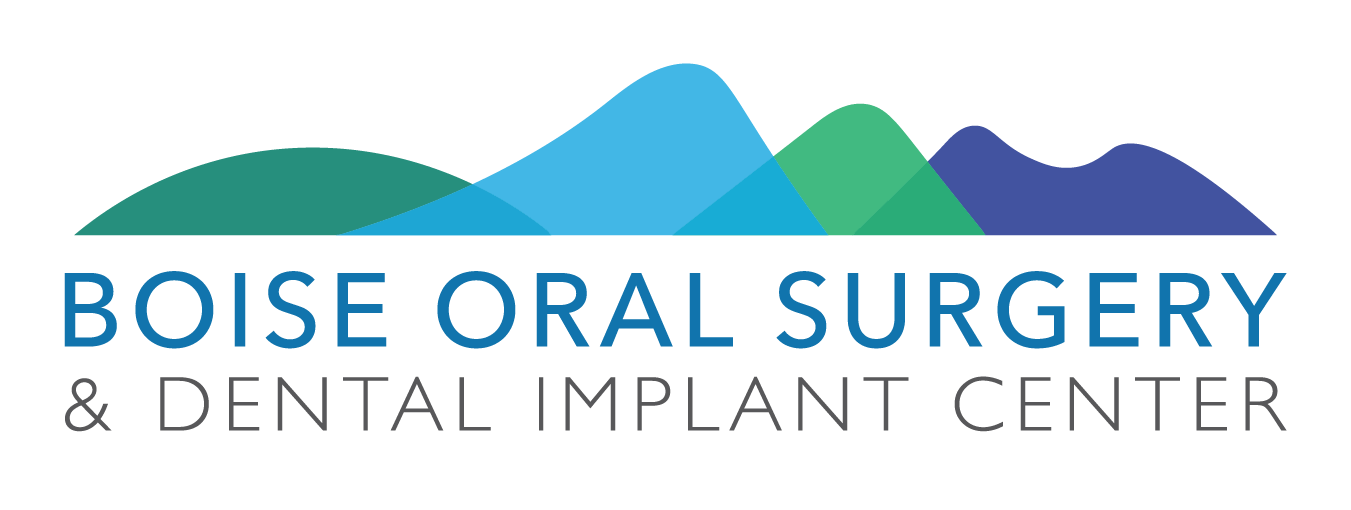Wisdom Teeth Removal Resource Guide
Your Guide to Wisdom Teeth Removal in Boise, Idaho
Wisdom Teeth Table of Contents:
- What Are Wisdom Teeth?
- What Age Do You Get Wisdom Teeth?
- How Do You Know If Your Wisdom Teeth Are Coming In?
- Why Are Wisdom Teeth a Problem?
- Do I Have to Have My Wisdom Teeth Removed?
- What Happens If You Wait Too Long to Get Wisdom Teeth Out?
- How Do I Prepare for Wisdom Teeth Extraction?
- What Should I Expect at My Extraction Appointment?
- Are You Awake During Wisdom Tooth Removal?
- How Long Is Wisdom Tooth Surgery?
- Should I Get All Four Wisdom Teeth Out at Once?
- What Is the Average Wisdom Teeth Removal Recovery Time?
- What Can I Eat After My Wisdom Teeth Removal?
- Home Care After Your Wisdom Teeth Removal
- Is Wisdom Teeth Extraction Covered by Insurance?
- Find an Experienced Oral Surgeon in Boise for Your Wisdom Teeth Removal
- Contact Boise Oral Surgery and Dental Implant Center

What Are Wisdom Teeth?
Nearly everyone is born with a third set of molars, commonly known as wisdom teeth. These teeth are found in the very back of your mouth with two on the top and two on the bottom, completing your full set of 32 adult teeth. However, a percentage of the population is born without a full set of all four wisdom teeth. While this may come as a surprise, if you are missing a wisdom tooth or two, it is not a cause for concern.
What Age Do You Get Wisdom Teeth?
Most people lose their last baby tooth around the age of 12. After that last permanent tooth emerges, you may think that you are done getting your adult teeth, but wisdom teeth are your final permanent teeth. In most cases, it takes a few more years after you lose your last baby tooth for your wisdom teeth to erupt. Somewhere between age 17-24 is typical, though earlier or later is not uncommon. Because these molars come in when we are older (and presumably wiser), they are called wisdom teeth. For some people, it can take a while for wisdom teeth to erupt fully.
How Do You Know If Your Wisdom Teeth Are Coming In?
Your general dentist will keep track of your wisdom teeth through the dental x-rays and oral exams they administer throughout your life. This is one reason why regular checkups with your dentist are important. In many cases, you will not feel much pain when your wisdom teeth come in, and the first sign you may notice is new molars coming up in the back of your mouth. Some people may experience tenderness, swollen gums, or a bit of pain as their wisdom teeth erupt, but for many, this is nothing more than a minor annoyance. A lack of pain now does not mean that your wisdom teeth will not cause problems later, though. And if you do experience serious pain at any point when your wisdom teeth are erupting, you should see your dentist as soon as possible.

Why Are Wisdom Teeth a Problem?
Crowded Wisdom Teeth
Though an adult has 32 permanent teeth, over time, our jaws have narrowed, allowing room for only 28 teeth to fit comfortably. Even if our wisdom teeth erupt from our gums with no problems, they can cause our other teeth to crowd and become misaligned, making teeth harder to keep clean and healthy. Dentists recommend that nearly 80% of their patients get their wisdom teeth removed.
Impacted Wisdom Teeth
In addition to crowding your other teeth, wisdom teeth can become impacted. This means that the tooth is unable to break through your gums and emerge fully. In some cases, the tooth may even be growing in at an angle, which can also cause your teeth to be misaligned. Impacted wisdom teeth can lead to pain, swelling, infection, and other tooth and gum problems as you age.
Do I Have to Have My Wisdom Teeth Removed?
Because wisdom teeth extraction is recommended for such a high percentage of the population, your dentist will likely recommend extraction at some point. Even if you are not experiencing pain, discomfort, or other symptoms, it is a smart idea to act on the surgery as soon as possible if it is recommended by your dentist.
Even if your wisdom teeth are not impacted, they are notoriously difficult to clean, because they are so far back in your mouth. If they are difficult to reach with your toothbrush or floss, you may develop gum disease, cavities, infection, or other problems. It may feel like painful or unnecessary surgery to go through with, but many people do not develop wisdom tooth problems until well after age 30. When you are younger, it is easier to heal and bounce back after surgery, so it is better to get them out sooner rather than later.

What Happens If You Wait Too Long to Get Wisdom Teeth Out?
If you do not have impacted wisdom teeth removed as a teenager or young adult, you will likely experience problems as you age. The teeth will try to continue to erupt, but they may push on your other teeth. In more serious cases, they can lead to issues like abscesses, tumors, cysts, or painful infections. When these issues occur, you will have to deal with the pain involved in the issue, as well as the extraction of your wisdom teeth, so getting them removed as a preventative measure is a smart idea.
As you age, the root system of your wisdom teeth will get longer and more solidified to your jaw, which can make extraction painful and more complicated. Therefore, it is recommended to get the surgery at a younger age. While in some cases, people do not experience any symptoms from their impacted teeth, getting them removed is a smart way to be proactive about your oral health.
How Do I Prepare for Wisdom Teeth Extraction?
In most cases, you will want to meet with an oral surgeon to discuss your extraction options. If your teeth are not impacted, your dentist may be able to remove them in-office, but oral surgery is the route many people take. Once your surgeon has set a date for the extraction, there are a few steps you can take to prepare for oral surgery of wisdom tooth extraction.

First, ask your dentist if you will be getting general anesthesia (i.e. you will be asleep during the surgery). If so, you will need someone to drive you to and from your appointment, as the anesthesia will make it hard to drive after the surgery. Additionally, general anesthesia can cause vomiting and nausea in some patients, so your surgeon may require you to not eat or drink after midnight the day before the surgery. Also, make sure you inform your surgeon about any prescription medications you are taking to ensure that there will be no interactions.
Do not forget to thoroughly clean your teeth, mouth, gums, and tongue before you head to your appointment, as you will not be able to do this for a few days after surgery. You may want to set up a recovery area in your home too, as you may be drowsy and in pain as your body heals. Set up a comfy couch with blankets and easy access to the bathroom so you do not have to walk far when you are feeling unwell.
What Should I Expect at My Extraction Appointment?
Once you arrive at your wisdom teeth extraction appointment, your surgeon will go over the procedure with you and make sure all your questions are answered. It is normal to be a little nervous, but this is a routine procedure and rarely causes any serious complications. When you are ready for the procedure to begin, your doctor will administer sedation, and begin the procedure. The type of sedation you will receive depends on what your dentist or surgeon recommended, and each type is explained below.
After the procedure is complete, you will be given some time to rest and recover. Once you are up and awake, you will be given instructions on how to care for your mouth in the coming days and weeks, and about any medication you will need to take. You will be able to leave the office and head home shortly after the surgery is complete.

Are You Awake During Wisdom Tooth Removal?
There are a few different sedation options that you may receive during wisdom tooth removal. In many cases, your regular dentist cannot administer general anesthesia, while oral surgeons can. With general anesthesia, you will be asleep, but recovery takes longer, while with local anesthesia you will remain awake during the procedure. Each sedation option has pros and cons, so be sure to discuss them with your medical professional before making a decision. Here are the types you will encounter:
Local Anesthesia
You will be fully awake during the extraction surgery and will likely feel some pressure but no pain. Local anesthesia is administered with injections around where the tooth or teeth are located. You have likely had local anesthesia before when getting a cavity filled. After the extraction is complete, you will be able to get up and walk around immediately. Local anesthesia can be combined with nitrous oxide (laughing gas), which can help to relieve nervousness and make the procedure more bearable. Nitrous oxide begins working immediately, wears off instantly, and has few side effects.
Sedation Anesthesia
This option is sometimes known as twilight anesthesia and is administered through an IV. With this type of sedation, you will not be fully conscious, but you will not be fully awake either. You will not feel any pain and most likely will not remember the procedure. During sedation anesthesia, you will get a local anesthetic to numb the site too. Your consciousness is suppressed, you will not feel any pain, and will have limited to no memory of the procedure.
General Anesthesia
If you have a more complicated case, or your teeth are badly impacted, general anesthesia is usually recommended. You will be completely asleep and will have no pain or memory of the extraction surgery. However, when you wake up from general anesthesia, you will feel very drowsy, and it may take a few hours for the sedation to wear off completely.
How Long Is Wisdom Tooth Surgery?
The length of your surgery will depend on the complexity of your case and how many teeth in total you are getting removed. In most cases, the surgery can take up to an hour and a half, though it usually can be completed in about an hour. It is important to also consider the time you will need afterward to recover before leaving the office.
Should I Get All Four Wisdom Teeth Out at Once?
When talking with your dentist or oral surgeon, one of the decisions you will have to make is whether to have a few teeth removed or four teeth out at once. If only one or two of your teeth are impacted or causing you problems, you may think that having only the affected teeth removed is a smart idea. But in many cases, the opposite is true.
Because wisdom teeth are so notorious for causing issues, if you are opting for surgery, it is a good idea to have all the teeth removed at once. If you only have two wisdom teeth removed and experience problems with your remaining wisdom teeth later down the line, you will have to go through the surgery and recovery process all over again. Also, it is more cost-effective to get all four removed at once.
What Is the Average Wisdom Teeth Removal Recovery Time?
After your wisdom teeth are removed, you will want to put aside at least two or three days for the initial recovery. You will likely be in pain and not want to do much other than rest and recover during these first few days. If you must schedule time off from work, school, or other regular activities, it is wise to give yourself plenty of time to heal. After that, you will be able to resume your normal activities. Your surgery site will be fully healed after a few days, and the gums will recover after a few weeks.
What Can I Eat After My Wisdom Teeth Removal?
Recommended Food
During the first few days after your surgery, you probably won’t feel much like eating, but it’s important to try to consume at least a little food to help keep your strength up so your body has the energy it needs to heal. In the first two or three days after your surgery, stick to exceptionally soft or liquid foods. Smoothies, broth, applesauce, yogurt, pudding, and mashed potatoes are all great options. After you can start to chew again, mashed banana, avocado, and scrambled eggs can help ease you back into solid food. Cold foods like ice cream and Jell-O can help to relieve some of the pain you may be feeling.

Food to Avoid
It is important to stay away from foods that are extremely hot, spicy, or acidic, as these can irritate the surgery site. So, stay away from hot tea or coffee, orange juice, or spicy soup. In addition, you will need to avoid alcoholic beverages. They can irritate your mouth or even interact with the pain medication you may have been prescribed. Small pieces of food like grains of rice or seeds can sometimes get stuck in the extraction site, so stay away from those for a few days as well.

Home Care After Your Wisdom Teeth Removal
Post-operative care for wisdom teeth removal is an essential part of the healing process. During the first two or three days after your surgery, rest as much as you can and avoid doing any strenuous activity or exercise until you feel well enough to resume. Swelling after oral surgery is normal. Apply ice on your face around the surgery site to help reduce swelling and ease any pain. Always take any recommended medications and take pain medication at the first sign of discomfort after your local anesthesia begins to wear off. The pain medicine may make you feel groggy, so avoid driving or operating machinery.
A small amount of bleeding or oozing is common after wisdom teeth surgery and can be controlled by placing a gauze pad on the site and biting down for about a half-hour. Avoid vigorous rinsing or swishing until the day following your wisdom teeth surgery, as this could loosen the blood clot on your surgery. Try to keep up with oral hygiene but brush very gently. The day after surgery, you can begin rinsing your mouth with warm salt water to promote healing.
Is Wisdom Teeth Extraction Covered by Insurance?
Since wisdom tooth extraction is such a common type of oral surgery, it is often covered by insurance providers. Check with both your dental and medical insurance providers, as one or the other will most likely cover at least part of the expense of surgery, especially if it is deemed medically necessary by your dentist.


Find an Experienced Oral Surgeon in Boise for Your Wisdom Teeth Removal
If you have been told by your dentist that you should have your wisdom teeth removed, it is important to find an experienced oral surgeon that you can count on. While wisdom teeth removal is a common surgery, it still poses some risks, so finding a trustworthy oral surgeon should be your first step.
Dr. Jeffrey Scott Bobst, of Boise Oral Surgery and Dental Implant Center is an oral and maxillofacial surgeon located in Boise, ID. Dr. Bobst is board-certified by the American Board of Oral and Maxillofacial Surgery. He and his surgical staff at Boise Oral Surgery & Dental Implant Center work hard to build a foundation of trust by treating each patient as a unique individual with specific oral health needs. They believe in working as a team to assess your needs, plan your treatment, ensure you experience an optimal post-operative recovery, and strive to deliver a compassionate patient experience. It is their goal to make you feel at ease during your treatment because they understand the anxiety that any surgical procedure can cause.
Contact Boise Oral Surgery and Dental Implant Center
Submit a contact form or call Boise Oral Surgery and Dental Implant Center at 208-322-5522 to learn how they can help improve your smile. Boise Oral Surgery and Dental Implant Center offers long-term solutions to your complex oral health problems and is happy to answer any questions you have about wisdom teeth so that you can make the right decisions about taking care of your oral health. They offer a wide range of surgical services including wisdom teeth extraction, dental implant placement, bone grafting, oral pathology screening, and facial trauma surgery.





